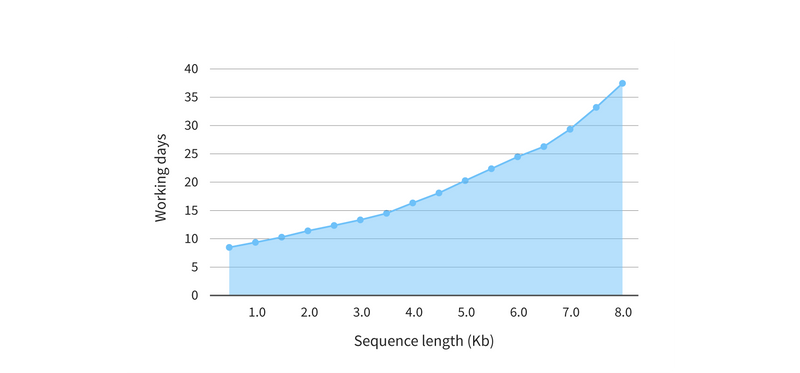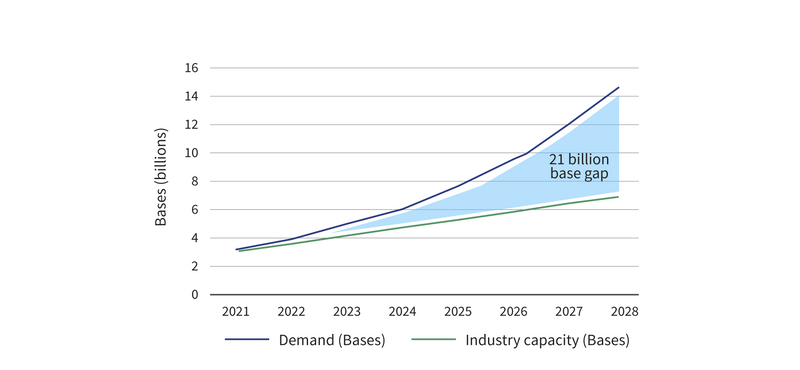Deep Biotech companies using engineering biology for good: Evonetix case study

Evonetix is developing a new tool that lets researchers build the building blocks of life – genes – faster and easier than ever before. This could lead to breakthroughs in medicine and agriculture. Read more in BIA's Deep Biotech report on disruptive innovation for global sustainability.
What does the company do?
Evonetix is developing a revolutionary technology for on-demand gene synthesis. Their platform integrates DNA synthesis with assembly and error correction, all on a specialised silicon chip within a benchtop device. This eliminates the need for time-consuming post-synthesis steps and offers researchers greater control over the process.
How does this tool benefit the engineering biology industry?
The need for engineering biology-based solutions is expanding across multiple economic sectors. With this, the demand for gene-length DNA is rising rapidly, increasing the pressure on supply chains and bringing attention to the quality and speed of production. Post-synthesis workflows necessary for sequence validation are time-consuming, leading to slow delivery of long DNA sequences.
Innovative technologies are emerging to address the technological challenges of synthesising gene-length DNA. But the methods commonly used in the industry each have their limitations. Due to the significant resources and labour required, DNA synthesis and assembly have become centralised services provided by a handful of reagent manufacturers, constrained by shipping times and costs, and requiring the sharing of confidential information outside of an organisation.

Time to validate a DNA sequence increases as the length of the DNA product increases.
What is the impact?
The projected demand for long DNA highlights a future 21 billion-base gap over the current industry capacity. This bottleneck will hamper innovations, causing delays in the design-build-test-learn cycle at the heart of engineering biology development, until accessibility of gene-length DNA is improved. This improved accessibility to long DNA will accelerate research and development in various fields, fostering innovation and leading to breakthroughs in areas like:
- Medicine: For example, Evonetix's technology could be used to create personalised therapies by engineering cells to fight cancer or other diseases. This could involve introducing new genes or modifying existing ones to give the cells specific abilities.
- Agriculture: Scientists can develop crops that are more resistant to pests, diseases, and drought by manipulating their genes with long DNA sequences. For instance, they could introduce genes that produce natural pesticides or improve the plant's tolerance to harsh conditions.
- Biomaterials: Long DNA can be used to create new materials with unique properties, such as self-healing fabrics or biocompatible implants. Imagine clothes that can repair small tears on their own or artificial joints that better integrate with the body.

As DNA demand accelerates, supply constraints created by centralised services lead to a 21 billion base gap.
Evonetix is developing technologies to integrate DNA synthesis with a staged assembly and error-removal process, all on the surface of a groundbreaking semiconductor chip. Its Binary Assembly® process joins complementary DNA strands by selective transfer of DNA from synthesis sites to assembly sites on its silicon chips. After complementary strands are annealed, the assembly sites are heated to sequence-dependent temperatures that promote rapid dissociation of imperfect matches from the chip, thereby separating and removing error-containing sequences whilst maintaining those with correct homology during the assembly process. This offers significant advantages over conventional approaches by lowering error rates and eliminating time-consuming post-synthesis steps. Duplex DNA fragments can be joined, and the process is repeated to assemble gene-length sequences.

Evonetix has developed a semiconductor chip that combines novel synthesis chemistry with thermal control to enable the synthesis of long, accurate DNA.
Evonetix has developed a semiconductor chip that combines novel synthesis chemistry with thermal control to enable the synthesis of long, accurate DNA.
Moreover, thermal control at distinct sites combined with parallel synthesis may also facilitate the elongation of challenging DNA regions. For example, selective heating can promote the synthesis of DNA segments with high GC content, which have higher melting temperatures and are prone to secondary structure formation.
What are the opportunities and challenges?
It is critical to prevent research progress from stalling between the “design” and “test” phases of the Design-Build-Test-Learn cycle and keep pace with the increasing demand for gene-length DNA. Further, a shift away from centralised service providers will allow laboratories to gain more control over gene synthesis, maintain confidentiality of proprietary sequences, and judge project timelines more accurately.
The potential for engineering biology to have far-reaching economic impact hinges upon access to fast, accurate long DNA. The development of benchtop gene printers represents a new breakthrough in gene synthesis technologies, meeting the growing need for this process to become more affordable, flexible, and scalable.
.png)
.png)